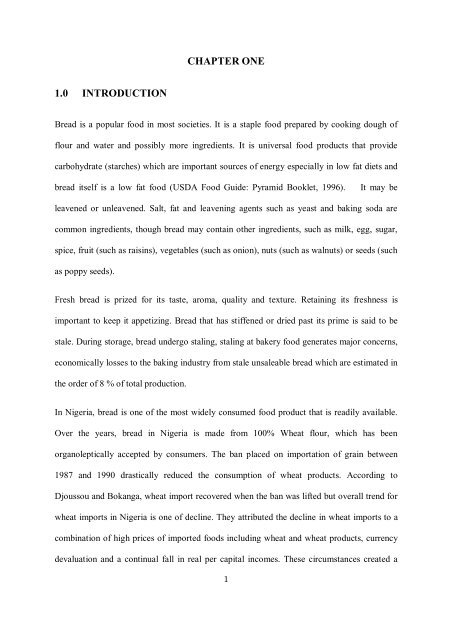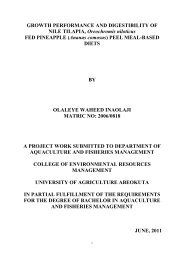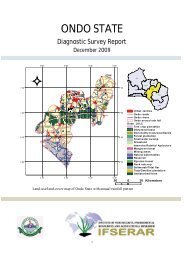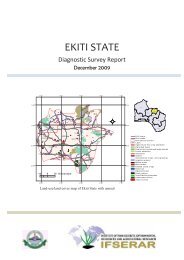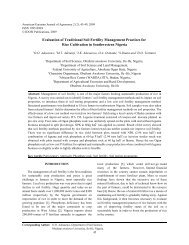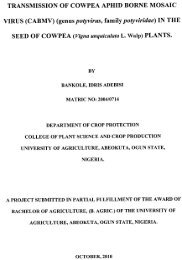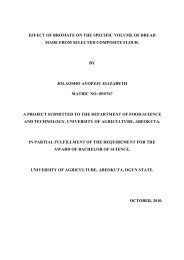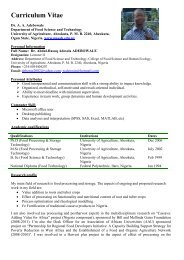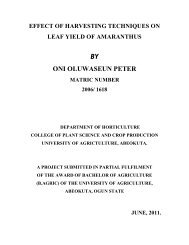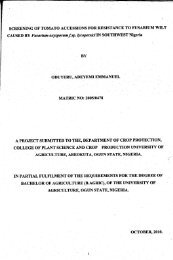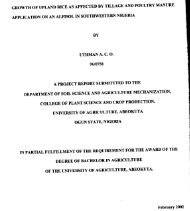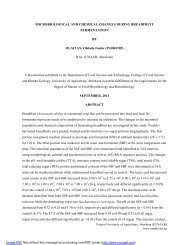consumer acceptability of spiced composite bread - The Federal ...
consumer acceptability of spiced composite bread - The Federal ...
consumer acceptability of spiced composite bread - The Federal ...
You also want an ePaper? Increase the reach of your titles
YUMPU automatically turns print PDFs into web optimized ePapers that Google loves.
CHAPTER ONE<br />
1.0 INTRODUCTION<br />
Bread is a popular food in most societies. It is a staple food prepared by cooking dough <strong>of</strong><br />
flour and water and possibly more ingredients. It is universal food products that provide<br />
carbohydrate (starches) which are important sources <strong>of</strong> energy especially in low fat diets and<br />
<strong>bread</strong> itself is a low fat food (USDA Food Guide: Pyramid Booklet, 1996).<br />
It may be<br />
leavened or unleavened. Salt, fat and leavening agents such as yeast and baking soda are<br />
common ingredients, though <strong>bread</strong> may contain other ingredients, such as milk, egg, sugar,<br />
spice, fruit (such as raisins), vegetables (such as onion), nuts (such as walnuts) or seeds (such<br />
as poppy seeds).<br />
Fresh <strong>bread</strong> is prized for its taste, aroma, quality and texture. Retaining its freshness is<br />
important to keep it appetizing. Bread that has stiffened or dried past its prime is said to be<br />
stale. During storage, <strong>bread</strong> undergo staling, staling at bakery food generates major concerns,<br />
economically losses to the baking industry from stale unsaleable <strong>bread</strong> which are estimated in<br />
the order <strong>of</strong> 8 % <strong>of</strong> total production.<br />
In Nigeria, <strong>bread</strong> is one <strong>of</strong> the most widely consumed food product that is readily available.<br />
Over the years, <strong>bread</strong> in Nigeria is made from 100% Wheat flour, which has been<br />
organoleptically accepted by <strong>consumer</strong>s. <strong>The</strong> ban placed on importation <strong>of</strong> grain between<br />
1987 and 1990 drastically reduced the consumption <strong>of</strong> wheat products. According to<br />
Djoussou and Bokanga, wheat import recovered when the ban was lifted but overall trend for<br />
wheat imports in Nigeria is one <strong>of</strong> decline. <strong>The</strong>y attributed the decline in wheat imports to a<br />
combination <strong>of</strong> high prices <strong>of</strong> imported foods including wheat and wheat products, currency<br />
devaluation and a continual fall in real per capital incomes. <strong>The</strong>se circumstances created a<br />
1


